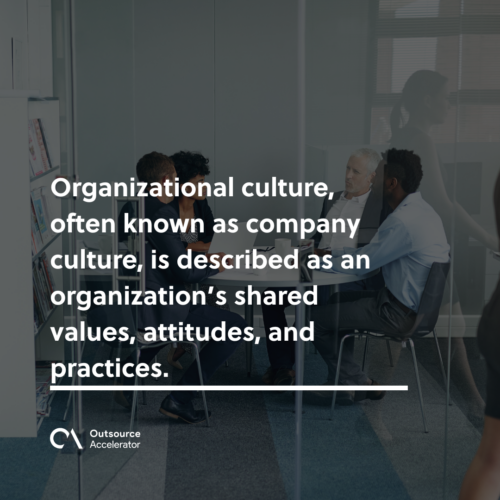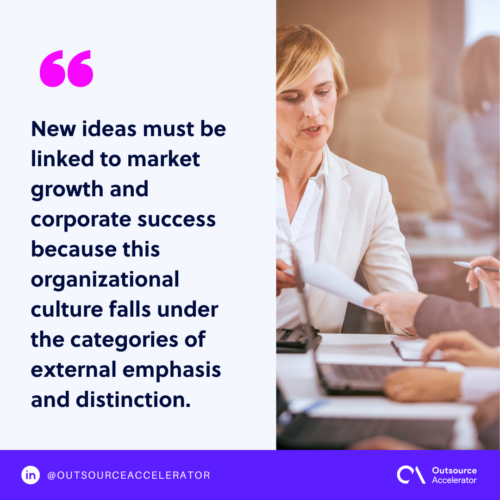Organizational culture
Definition
What is organizational culture?
Organizational culture, often known as company culture, is described as an organization’s shared values, attitudes, and practices.
It is the company’s personality, and it has a significant impact on the employees’ overall satisfaction.
Organizational culture should not be mistaken with corporate goals or a mission statement, though both can help define it. Culture is formed through persistent and real behaviors.
You can observe the organizational culture in action when you see how a CEO responds to a challenge, how a team adjusts to new consumer expectations, or how management corrects an employee who makes a mistake.
A strong business culture showcases good attributes that contribute to improved performance.
In contrast, a dysfunctional company culture brings out characteristics that can block even the most successful organizations.
Developing a successful organizational culture within your business boosts employee engagement and performance, resulting in greater retention rates.
It takes time and work to develop a great company culture – your organization’s culture must accurately reflect your beliefs and fit with your entire business goal.
Now, let’s dive into the four main types of organizational culture.

Types of organizational culture
While any given organizational culture will develop over time, you may take measures to adapt your culture to best fit your organization’s values and mission.
As a business owner, you need to understand the type of organizational culture that currently exists at your company.
So, here are the types of organizational culture:
The clan culture
A clan culture is people-oriented in that the organization feels like a family.
This is a highly collaborative work environment where every individual is appreciated, and communication is of the utmost importance. Its primary focus is mentorship and teamwork.
There’s a great possibility for market growth within a clan culture because of its highly adaptable environment. These firms are action-oriented and embrace change, showing their adaptability.
Clan culture is commonly associated with a horizontal structure, which contributes to the breakdown of barriers between executive-level managers and staff.
The adhocracy culture
Creativity and innovation must be at the core of an adhocracy culture. Companies must be willing to take risks.
Employees are encouraged to take chances, and executives are viewed as entrepreneurs or innovators.
New ideas must be linked to market growth and corporate success because this organizational culture falls under the categories of external emphasis and distinction.
Professional development possibilities are also simple to explain when there is an emphasis on innovation and fresh ideas.

The market culture
The focus of market culture is goal-oriented, with strong and demanding leaders. This culture is based on the dynamics of competition and the achievement of concrete results.
The group is linked by a common goal of success and defeating all competitors. Market share and profitability are the primary value factors of this type of organizational culture.
Market culture prioritizes profitability and success in businesses and emphasizes the importance of meeting quotas, reaching objectives, and generating outcomes.
The hierarchy culture
In a hierarchical culture, the work environment is formal, with strong institutional processes in place to provide guidance.
Leadership is built on systematic coordination and monitoring, with a culture that values efficiency and stability.
Consistency and uniformity are among the values of this type of organizational culture.
Companies with hierarchical cultures follow the typical corporate structure. Hierarchy cultures have a fixed method of doing things, which makes them stable and cautious.
Why is organizational culture important?
When it comes to recruiting people and surpassing the competition, organizational culture is a key factor.
Organizational culture influences every aspect of your company, from punctuality and tone to contract conditions and employee benefits. When your work environment is in sync with your workers’ needs, they are more likely to feel at ease, supported, and appreciated.
After all, an organization’s culture is one of the most important predictors of employee satisfaction. It is also one of the major reasons why workers stay in the company.
Companies that value culture are more likely to withstand difficult times and changes in the business environment and come out stronger.







 Independent
Independent




